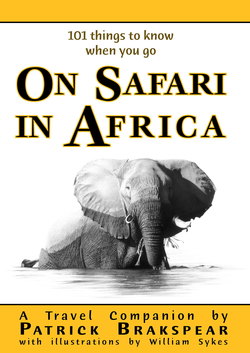Читать книгу (101 things to know when you go) ON SAFARI IN AFRICA - Patrick Brakspear - Страница 44
На сайте Литреса книга снята с продажи.
Tips for self-drivers
ОглавлениеIf you are planning to pick up a hire car and self-drive, a possibility in countries like South Africa, Namibia and Zimbabwe, be aware of the following:
All these countries drive on the left-hand side of the road and display distances and speed limits in kilometres (kms).
In South Africa there is a prevalence of four-way-stop intersections – these require you to come to a complete stop and give way to all other vehicles that have arrived at the 4-way stop before you – only then can you go proceed. Simple, but a little disconcerting initially.
Vehicles in traffic circles (often referred to as roundabouts) travel clockwise. Drivers wishing to enter traffic circles should give way to the right i.e. to those already on , or entering the roundabout from your right.
If you’re driving behind another car and that car pulls to the shoulder but continues driving, it means they are letting you pass. If it’s safe to pass you may do so (only if there is a dotted line and no cars coming from the other direction). When you pass someone, be sure to turn on your hazard lights as a way of saying “thank you” – it’s what they all do. And then, if someone is tailgating you or wants to get past you, the polite thing to do is cautiously pull into the shoulder and slow down slightly to let the driver pass (only do this if you can clearly see that the shoulder is clear) – do NOT do this when going around a bend.
Fuel – whilst fuel is generally readily available not all petrol/fuel stations are open 24 hours. You should always fill up when passing through major towns and plan your journey with fuel stops in mind (and carry extra fuel if deemed necessary in more remote areas).
Fuel stations are generally not self-help but manned by attendants who can also check oil, water and tyre pressure if required. Gratuities for this service are at your own discretion.
Be sure to have not only your driver’s license to hand but also the car’s papers – registration, car insurance and any required reflectors/chevron or triangles (in case of breakdown). Wearing seat belts when driving a car in the region is mandatory. The use of a mobile phone while driving is prohibited, with the exception of a hands-free system.
Be conscious of your own security and that of the vehicle – be sure to lock the vehicle when unattended and do not leave any valuables in plain sight.
In the cities and towns you may notice that there is a system of “unofficial” parking attendants who will tell you where to park, guide you into the appropriate bay, and will then watch your car whilst you go into the shops. Get their name, and when you return back to your car, pay the attendant a 'tip' as a thank you for watching your car. It is all about peace-of-mind.
If possible, avoid travelling at night (abandoned/unlit vehicles, pedestrians and stray animals could present a danger).
Large antelope or other wild animals (even hippo and elephant) crossing the road can also be a hazard in certain areas.
Drive safely and take heed of speed limits."To adventure is to live. To break the shackles of habit and custom, to shake free from the ordinary and the mundane is to make life a never ending journey of discovery and reward." - Clive Walker
